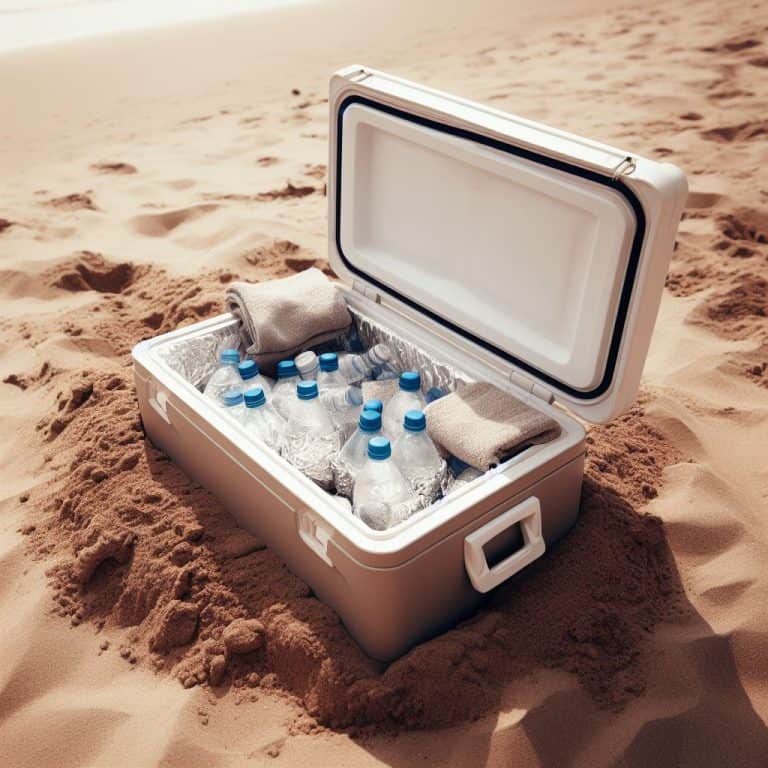How to Stay Awake While Driving In 2023: A Must-Read Guide

Have you ever been driving for several hours and thought you saw something run across the road in front of you that wasn’t there?
What about driving while exhausted for many miles only to forget the last few miles and how you got there?
These are extremely dangerous situations and are telltale signs that you need to stop immediately and get some rest!
So, sit back and let me share some tips that have worked for me on how to stay awake while driving.
A Closer Look at How to Stay Awake While Driving
Your Sleep and the Body’s Circadian Rhythm
Your Circadian Rhythm plays an important part in your quality of sleep. Here’s a deeper dive into understanding how your circadian rhythm works.
Understanding the Basics of Your Circadian Rhythm
The circadian rhythm, often referred to as the “body clock,” is a 24-hour internal clock running in the background of your brain, cycling between sleepiness and alertness at regular intervals.
It’s not just about controlling your sleep, this rhythm also influences hormone production, cell regeneration, and other biological functions to keep your body thriving.
Understanding the basics of this powerful rhythm is the first step towards maximizing your daily productivity, improving sleep quality, and maintaining your overall health.
How Your Circadian Rhythm Affects Your Sleep
Your circadian rhythm is like the control center for the quality and structure of your sleep.
From the timing of your deepest REM cycles to the release of sleep hormones like melatonin, your circadian rhythm is the unseen conductor of your nighttime rest.
Impact of Light on Your Circadian Rhythm
Light affects the circadian rhythm by signaling your body’s internal clock through special photoreceptors in your eyes.
During the day, exposure to light keeps us alert by suppressing the sleep hormone melatonin. In the evening, when light levels decrease, the photoreceptors trigger the release of melatonin, promoting sleepiness and preparing the body to rest.
Artificial light, such as smartphones and computer screens at night can disrupt this cycle, leading to trouble falling asleep and causing you to stay awake.
Managing light exposure by getting natural light during the day and limiting bright artificial light at night helps maintain a healthy circadian rhythm.
The Perils of Drowsy Driving
Recognize the Signs of Drowsiness
You might be able to convince yourself that you can close your eyes for “just a second.” If you’ve ever accidentally fallen asleep, you’re probably aware that you didn’t see it coming.
Closing your eyes, even for a second is a dangerous risk that can quickly lead to you waking up in a mangled car, or worse. Here are a few other warning signs of drowsiness you shouldn’t ignore.
Frequent yawning
Trouble staying focused
Lane drifting
Forgetting the last few miles you just drove
Daydreaming/Fuzzy thoughts
Recognizing these signs of sleepiness is the first step to combating feeling drowsy while driving so you don’t fall asleep behind the wheel.
Remember, at least seven hours is the recommended duration of high-quality sleep that is recommended for most people.
However, this is somewhat subjective since everyone is different. It’s important for you to know yourself and what an adequate amount of sleep would be for you to perform at peak levels.
The Unseen Danger of Microsleep
Microsleeps are brief episodes of sleep that can last from a fraction of a second to about 30 seconds. They can sneak up on you without warning, causing unintended lane changes or missing exits.
Talk about scary!
Impaired Reaction Time and Decision-Making
Sleep deprivation can drastically affect your ability to make split-second decisions on the road, reducing your reaction times.
When your brain is too tired it can’t tell your body how to respond in a split-second decision.
Increased Risk of Accidents
Of course, drowsy driving can lead to an increased risk of accidents.
According to the National Highway Traffic Safety Administration, it’s estimated that 100,000 police-reported crashes each year are the result of driver fatigue!
Long-Term Health Consequences of Chronic Sleep Deprivation
Chronic sleep deprivation not only affects your ability to drive but being sleep deprived can also have long-term effects on your health, including mental health, physical health, and overall quality of life.
For any ongoing problems with inadequate or insufficient sleep, consult your physician to make sure you don’t have any sleep disorders that you may not know about.
Legal Consequences of Drowsy Driving
Some jurisdictions consider drowsy driving as reckless behavior similar to drunk driving, especially if it results in an accident.
Just think of how you feel with little to no sleep after a while. It gives you an intoxicated feeling, almost like you are drunk!
Sleepy driving IS impaired driving, so treat it as such and make sure you are in tip-top form when setting off on your drive.
A Few Tips & Tricks to Help You Stay Awake
Now that we’ve familiarized ourselves with the enemy, let’s get down to the fun part.
Here are some tried and tested tips to help you stay awake on your journey. They do make a difference!
Play the License Plate Game
I played this a lot as a kid growing up in the early 90s, as I’m sure many of you probably have as well back in the day.
The good old “License Plate Game”. Spot a license plate from each state, or make it a contest if you’re feeling competitive.
But remember, the road isn’t going anywhere, so keep your eyes on it!
Blast Some Tunes
Music has the power to uplift our mood and keep us energized. So, crank up the volume and let your favorite tunes keep you company.
Just don’t get too carried away singing along and accidentally drive 2 hours out of your way.
Snack Time!
Keep some healthy snacks at hand. Yes, healthy.
Keep sweets for after the trip or eat in minimal moderation. Opt for fruits, nuts, or protein bars for more sustainable energy.
Eating not only gives you energy but also keeps your mind going, as long as there’s nutritional value.
The Power Nap
Power naps are just that…POWERFUL. You can really crank your energy levels back up with just a short nap.
Just pull over at a rest stop or any quiet place for that matter and let yourself have a quick 20-minute shut-eye session.
I accidentally succeeded in taking a power nap for the first time when I was in high school and it completely surprised me how much it helped!
You’ll be amazed at how rejuvenated you’ll feel as well.
Exercise Your Mind and Body While On the Go
Taking rest breaks along the way is the most ideal way of staying awake.
Enjoying the outdoors and the fresh air at a nearby park or rest area can keep your blood flowing and your mind focused.
Take a walk, read a book, or just sit back and relax in peace.
Hydrate Wisely and Limit Caffeine
Keep your caffeine intake during the beginning stages of your trip and keep it limited so you don’t go overboard and have a caffeine crash later.
Also, try to avoid heavy sugar in your caffeinated beverage since it can spike and crash your blood sugar in a short period of time. This will make it much more difficult to stay awake while driving long distances.
Also, always regularly drink water throughout the day to stay hydrated, combat fatigue and stay alert.
The Essential Role of Co-Pilots
This one’s self-explanatory.
Driving with a companion can help you stay alert and share your driving responsibilities, keeping you from using all of your energy at once.
Conclusion: Remember, Safety Comes First
Finally, let’s not forget that safety comes first. While all these tips and tricks can help you stay awake, there’s no substitute for a good night’s sleep before a long drive.
After all, you don’t want to end up explaining to a police officer that you swerved because you were trying to kill a fly or were just testing how fast you could turn the steering wheel with your eyes closed.
In all seriousness, if you are planning on going for a long drive, prepare yourself ahead of time by getting adequate sleep and hydrating properly.
Safe travels, my fellow road warriors!





